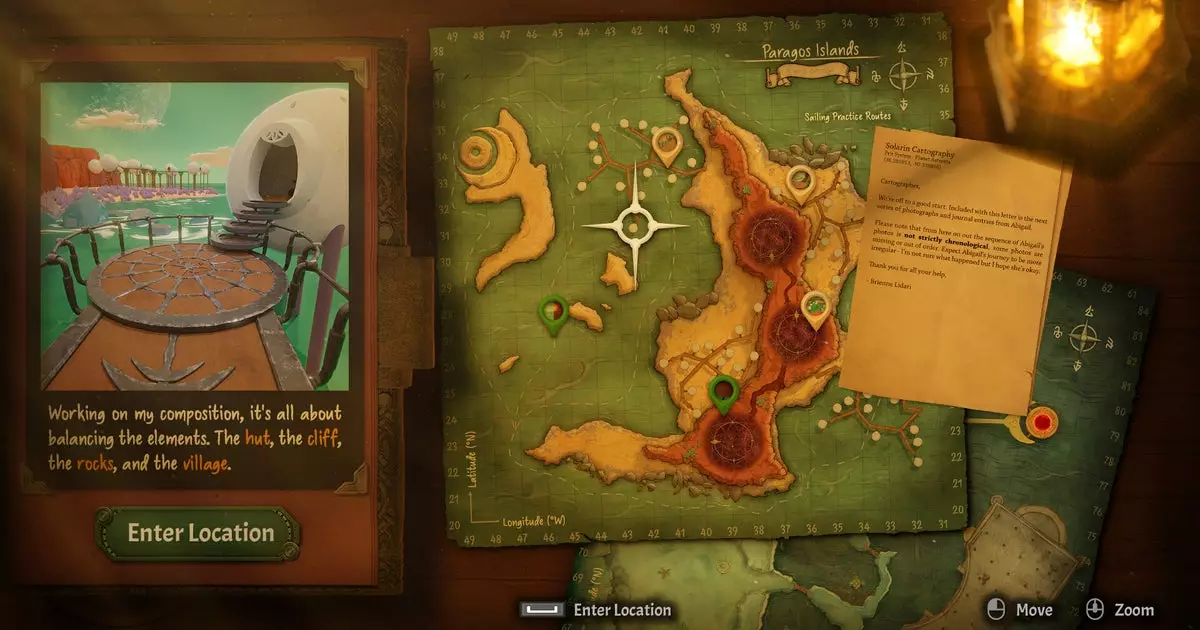Locator is a fresh entry into the detective puzzle genre that is designed not only for fans of intricate mystery games but also for those drawn to the enchanting allure of unexplored alien terrains. This innovative title casts players as an interstellar cartographer who embarks on a journey to uncover the whereabouts of a missing archaeologist, Abigail Lidari, on an enigmatic alien planet. The game taps into elements reminiscent of the geography-based browser game Geoguessr, enticing players with a novel blend of puzzle-solving and exploration.
At its core, Locator invites players to immerse themselves in a world defined by stunning artwork and well-crafted maps, requiring careful attention and analytical thinking. As players sift through a trove of photographs and Abigail’s personal journal notes, they are tasked with accurately pinning her location on the charming maps presented. Each successful placement of three pins reveals whether they have correctly identified Abigail’s position, fostering a sense of progression in their investigative journey. This dynamic transforms a seemingly straightforward game of recognizing landmarks into a profound exercise in information synthesis and problem-solving as players must interpret cryptic hints from Abigail’s notes.
What sets Locator apart is its emphasis on empathy and perspective-taking. As players engage with Abigail’s journey, they find themselves not only solving puzzles but also stepping into her shoes—attempting to perceive the alien world through her experiences. This compelling narrative approach adds an emotional dimension to the gameplay, allowing players to connect with Abigail’s situation on a human level. An early example involves discovering massive statues within a subterranean alien tomb, whimsically named by Abigail, who embellishes her diary with playful drawings. This blend of creativity and whimsy highlights the psychological impact of isolation and the unique ways individuals cope when faced with solitude in unfamiliar environments.
The game integrates various elements—from alien architecture to cryptic symbols—that players must consider to accurately identify locations based on the provided clues. Fans of the genre will appreciate the shift between visual assessment and logical deduction, reminiscent of the challenges found in classic detective narratives. The phrase on the game’s Steam page aptly captures its essence: “Locator combines the spatial reasoning of Geoguessr with the logical deduction of detective games.” This combination is likely to resonate with players who have a penchant for mapping and geography, as the game cultivates a rich tapestry of exploration and discovery.
Maps have long held a mythic status in human culture, serving as both navigational tools and symbols of larger concepts—be it identity, territory, or consciousness. Concepts like “cartographer’s folly” illustrate the humor and irony sometimes inherent in map-making, reminding players that what they see might not always reflect reality. The philosophical quote, “the map is not the territory,” invites introspection about how we interpret and understand the world around us. Locator challenges players to navigate these very complexities as they piece together Abigail’s journey through a blend of geographical and emotional introspection.
As of now, the game does not have a set release date, but it promises to offer a captivating interplay of map exploration and narrative depth. Locator is poised to intrigue both puzzle enthusiasts and those with a deep appreciation for the artistry of cartography, making it a noteworthy title to watch in the landscape of indie gaming.

